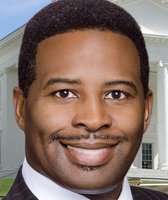Stand up for the facts!
Our only agenda is to publish the truth so you can be an informed participant in democracy.
We need your help.
I would like to contribute
Bob Good makes misleading comments about 'army' of IRS agents
If Your Time is short
- The 87,000 figure includes hires across the IRS, including information technology and taxpayer services, not just for enforcement agents as Good suggests.
- The Treasury Department says people and small businesses making less that $400,000 a year will see no change. Audits will increase for high-earning individuals and corporations.
Rep. Bob Good, R-Va., says Democrats all but declared war on the middle class by supporting a tax and spending bill signed by President Joe Biden that will expand the Internal Revenue Service.
The law, called the Inflation Reduction Act of 2022, allocates about $80 billion for the IRS during the next 10 years with an expectation it will boost tax collections by $204 billion. Among other purposes, the agency says it will use the money to target high-income earners and corporations.
Good, along with many other Republicans, said he doesn’t believe it.
"Democrats are voting to add an army of 87,000 IRS agents who will target middle class taxpayers and conduct at least 1 million more audits each year," Good tweeted on Aug. 10. Good represents the 5th Congressional District, spanning from Danville north past Charlottesville to Warrenton.
Good’s office didn’t get back to us to explain where he got his information, but his statement is misleading.
No army of 87,000 agents
This 87,000 figure comes from a May 2021 Treasury Department assessment of how it would use $80 billion to improve IRS operations. The report said the IRS would add 86,852 new full-time positions. (The plan is not written in stone. The Treasury said that in the coming months, it will decide how to allocate the new money.)
But even in the 2021 plan, not all of the hires would be auditors or work in enforcement. The report said the money would go toward many things, including "hiring new specialized enforcement staff, modernizing antiquated information technology, and investing in meaningful taxpayer service."
Although the agency’s staff would increase, it’s key to note that more than half of the IRS workforce is close to retirement. The plan was created with that exodus in mind. Today, the IRS has about 80,000 employees.
"The IRS will lose about 50,000 people over the next five or six years," Natasha Sarin, Treasury’s counselor for tax policy and implementation, told PolitiFact National. "A lot of this hiring is about replacing those people."
During the past decade, the IRS has seen its funding cut by 20%. Between 2010 and 2018, the number of enforcement personnel fell by about one-third.
So, the 87,000 people won’t exclusively work on the enforcement side, and they won’t all boost the overall size of the IRS workforce.
Not targeting the middle class
Good’s claim that the IRS will crack down on the middle class has been a Republican talking point based on faulty calculations by U.S. Rep. Kevin Brady, R-Texas.
In 2021, the Congressional Budget Office said that $80 billion more for the IRS would "return audit rates to the levels of about 10 years ago."
Brady took the audit rates of 2010 and applied them to the number of tax returns in 2018 — broken down by income groups. Using his approach, he claimed there would be about 710,000 more audits for filers reporting less than $75,000 in income.
But the approach ignores several key details from the CBO report and what the bill — and the Treasury — have made clear: This effort is intended to increase audits of corporations and high-net-worth individuals.
The full sentence in the CBO report that Brady was drawing from said the audit "rate would rise for all taxpayers, but higher-income taxpayers would face the largest increase." Brady took a broad statement and applied it across the board to all income groups.
Brady also failed to note a key difference between the CBO assessment from a year ago and the bill that passed Congress last week. The CBO assumed in its report that $60 billion of the $80 billion would go toward enforcement. But in the law Biden signed Tuesday, substantially less than that — $46 billion — goes to enforcement, according to a Congressional Research Service analysis. With nearly one-third less money, the number of resulting audits likely would also be less than originally predicted.
Perhaps most important, however, Brady’s projection and Good’s statement run directly counter to the stated policy of the IRS. Treasury Secretary Janet Yellen laid out the agency’s policy in a letter to IRS Commissioner Charles Rettig.
"I direct that any additional resources — including any new personnel or auditors that are hired — shall not be used to increase the share of small business or households below the $400,000 threshold that are audited relative to historical levels," Yellen wrote Aug. 10.
That wasn’t new information. Rettig — who was appointed by former President Donald Trump — said the same thing in an Aug. 4 letter to Congress.
Audit rates for filers reporting less than $75,000 have held steady during the past several years at about 0.4%. In contrast, in 2011, the audit rate was more than double — at 1%.
Yellen said enforcement will focus on corporations and people with high net worth; auditing them requires staff with special skills. At its current funding, she said, the agency is able to audit only about 7,500 out of 4 million such returns each year.
The Treasury's Sarin said the new audits will be focused on high earners because that’s where the money is. The top 1% of earners, she said, account for about 30% of the $600 billion each year that is owed but goes uncollected.
We should finally note that we could find no basis to prove or disprove Good’s claim that the IRS will conduct an additional 1 million audits a year. The CBO has not estimated the number of audits that will result from the law.
The IRS spent $5 billion on tax enforcement during the 2021 fiscal year and conducted 740,000 audits. The bill is expected to add about $4.5 billion annually to the enforcement budget.
Our ruling
Good said, "Democrats are voting to add an army of 87,000 IRS agents who will target middle class taxpayers and conduct at least 1 million more audits each year."
The Inflation Reduction Act will increase staffing and enforcement at the IRS. But the 87,000 figure is flawed because not all of those employees would work in IRS enforcement, and not all of them would be new employees added to the overall workforce. Many of the hires will replace an estimated 50,000 IRS workers who are expected to retire this decade.
There is no basis for saying the IRS will target the middle class. To the contrary, the administration has ordered no increase of auditing earners making less than $400,000.
The last part of his statement — that the IRS will conduct at least 1 million more audits a year — is undetermined. It’s clear the agency will be auditing more tax returns from high earners, but there’s no official estimate on how many more.
All told, we rate Good’s statement Mostly False.
Our Sources
Bob Good, Twitter, Aug. 10, 2022
PolitiFact, "Kevin McCarthy’s mostly false claim about an army of 87,000 IRS agents," Aug. 11, 2022
U.S. Treasury Department, "The American Families Plan Tax Compliance Agenda," May 2021
Internal Revenue Service, "IRS Budget & Workforce," May 26, 2022
The Washington Post, "Hyperbolic GOP claims about IRS agents and audits," Aug. 11,
2022
Congressional Budget Office, "Estimated Budgetary Effects of H.R. 5376," July 27, 2022
CBO, "The Effects of Increased Funding for the IRS," Sept. 2, 2021
Janet Yellen, letter to Charles Rettig, Aug. 10, 2022
Browse the Truth-O-Meter
More by Warren Fiske
Bob Good makes misleading comments about 'army' of IRS agents
Support independent fact-checking.
Become a member!
In a world of wild talk and fake news, help us stand up for the facts.





















































